Record earnings, the role of diversification in achieving those earnings and the prominence of used vehicles as part of that diversification were among the main themes of the Penske Automotive Group third quarter 2018 earnings results.
PAG and its chairman and CEO Roger Penske reported during the results call on Oct. 25 that the record quarter was driven by diversification, and the company’s standalone used-vehicle supercenters helped lead the way in that diversity, along with Penske heavy-duty truck dealerships and truck leasing investments.
Roger Penske expanded on the strength of used vehicles during the question-and-answer period at the end of the results call, noting that consolidated reconditioning locations and double discounting played a role in the company’s record earnings.
“Double discounting means you have an Internet price, someone comes in on an Internet price, and the first thing your salesperson does is give him a discount,” Penske said. “So, I think it’s managing your team. Double discounting has really helped us to maintain our used, and both new and used gross profit as you’ve seen that increase during the quarter.”
PAG’s earnings results were mostly positive all around. For the three months ended Sept. 30, 2018, income from continuing operations attributable to common shareholders increased 38.0 percent to a record $130.1 million, and related record earnings per share increased 39.1 percent to $1.53 when compared to the same period last year.
Total revenue of $5.7 billion represented an increase of 2.4 percent, while same-store retail revenue increased 0.2 percent.
Roger Penske elaborated on the benefits of diversification in a quote from the press release that accompanied the earnings report, noting that the strong earnings in the quarter were due to increases in new-vehicle, used-vehicle and finance and insurance gross profit per retail unit sold, along with a 70-basis-point increase in service and parts gross margin.
He also gave attention to the strength of the company’s standalone used-vehicle supercenter operations in the U.K., stating that the supercenters, along with Penske’s premium brand mix, helped contribute to another record quarter for the company’s U.K. business.
Supercenter strength
Further emphasizing the importance of the company’s used-vehicle supercenters during the earnings call, Roger Penske noted that the company expects to retail nearly 70,000 vehicles through the supercenters in 2018, and they will generate about $1.2 billion in revenue.
He added that the five supercenters in the U.S. and nine in the U.K. use a one-price, no-haggle approach. Year-to-date, the standalone used dealerships retailed 56,000 units and generated $1 billion in revenue and a return on sales of approximately 3.9 percent. Penske noted during the earnings call that the average transaction price is $15,000, and the variable gross profit per unit is almost $2,200, for a variable gross margin of 14.5 percent.
The revenue mix for these stores is 84 percent used vehicles, 9 percent wholesale, 6 percent F&I, and 1 percent service and parts. Gross profit contribution is 42 percent used, 2 percent wholesale, 39 percent F&I, and 17 percent service and parts.
“We expect to grow the standalone used business through a combination of e-commerce initiatives and new market introductions,” Penske said. “We're in the process of developing four new standalone sites, which we expect to open in the latter half of 2019.”
He discussed how his company sourced used vehicles in response to a question from an earnings call participant. Penske noted that trade-ins were “the first level of acquisition of used,” followed by auctions. Internet purchases were another sourcing method.
“And then, there’s a tremendous amount of lease returns coming back … not only in ’17 (and) ’18 but beyond into ’19,” he said. “We have the opportunity to make big purchases on those. In fact, in the U.K., I know they buy sometimes between 1,000 and 1,500 vehicles at a time, which gives them very good pricing and a broad mix of vehicles, so those would be the key areas of acquisition.”
Technology was another main theme of the earnings call. Roger Penske went on to discuss the technology in use at the used-car supercenters in the U.S. and U.K., and a presentation accompanying the earnings report noted that certain U.K. standalone used-vehicle supercenters allow customers to reserve a vehicle online. That technology has allowed the company to use the fundamentals of determining what it buys at what price and for what location.
“I think with the technology they developed, and this is in-house, it’s given us the ability to buy the right vehicle to give us the turn on our inventory,” Penske said.
Another questioner asked Penske if PAG could double the revenue of its standalone used-vehicle business in the next two to three years. Penske answered that although acquisitions are not currently at the top of the company’s list at the moment, “acquisitions, plus organic growth, plus the new sites will give us a chance to double that revenue.”
Going back to the opening remarks, Penske concluded his remarks by noting that in a strong U.S. economy and with the strength of the business’ premium and luxury automotive brand mix, the continued strength of the class 8 heavy-duty truck market in North America, the growing standalone used vehicle operation, and the benefits PAG continues to receive from its truck leasing investments, “We remain confident and optimistic about the future of our business.”
Another publicly traded dealer group has made a significant investment in the online car sales space.
AutoNation said Tuesday it has obtained roughly a 7-percent ownership stake in Vroom after a $50 million strategic investment in the online car retailer.
“We are excited about our investment in Vroom and the potential collaboration between our companies,” AutoNation chairman, chief executive and president Mike Jackson said in a news release.
“With this strategic investment, AutoNation remains uniquely positioned to lead our industry towards the future of the consumer buying experience,” he said.
Vroom has been one of the leading online car sales platforms to crop up in the past handful of years, along the likes of Carvana and Shift.
Paul Hennessy has been Vroom’s CEO since June 2016. He joined the company after serving as the CEO of Priceline.com and chief marketing officer of Booking.com (both are part of Booking Holdings Inc.)
“AutoNation has been one of the chief trailblazers in transforming automotive commerce in the past several decades,” Hennessy said in the news release. “It is a perfect fit to have them in our family as our industry is quickly scaling towards the digital purchase and sale experience that we are offering.”
AutoNation reported third-quarter results Tuesday morning and was set to host an investor’s call at 11 a.m. ET. Net income from continuing operations for the quarter were $112 million, up from $98 million a year ago. The earnings per share of $1.24 was a third-quarter record.
In its earnings release, AutoNation says investing in Vroom, “provides a foundation for potential strategic partnership opportunities with experienced and proven e-commerce executives.”
It follows a similar move by fellow public retailer Lithia just last month.
With its $54 million investment, Lithia led a $140 million round of Series D financing in Shift, an online automotive marketplace. The funding, which included equity and debt, more than doubled Shift’s total financing of equity and debt, bringing it to $265 million. Lithia and Shift also formed a strategic partnership, and Lithia CEO and president Bryan DeBoer joined Shift’s board of directors.
And then in mid-October, Shift quadrupled its floorplan capacity thanks to a new credit line for buying used cars. With that news came Lithia acquiring more equity interest in the online marketplace.
Lithia chief financial officer John North said in an Oct. 11 news release: “Our deep industry relationships resulted in an immediate benefit for Shift. Access to capital for inventory procurement will increase vehicle sales. As a result of this collaboration, Lithia has received an additional equity interest in Shift.”
Reconditioning is a vital part of most any retail used-car sales operations, including those in the growing standalone pre-owned store space.
With that in mind, EchoPark Automotive — which is Sonic Automotive’s chain of used-car stores — has lined up auto reconditioning software provider AutoMobile Technologies to provide workflow automation software to its reconditioning facilities, including Charlotte, N.C., Dallas and Denver.
The recon facilities are now using the AMT ReconPro and ReconMonitor platforms.
“AMT software provides EchoPark Automotive a scalable tool with a common language platform,” executive vice president of operations Tim Keen said in a news release. “It increases our efficiency, saves costs and cycle times so we can deliver consistent high-quality vehicles to our customers.”
Added AutoMobile Technologies EVP of operations Eric Meahan, “EchoPark has one of the most robust reconditioning operations we’ve ever seen, providing great value to customers across their inventory of nearly-new vehicles. We are proud to enhance that value with ReconMonitor’s efficient workflow management capabilities in vehicle recon
“Dealers lose an average of $35-50 per day that cars spend undergoing reconditioning. Our partnership will allow EchoPark to reduce costly delays and make better vehicle recon decisions early in the cycle,” Meahan said. “That results in better inventory availability for their customers and ultimately, increased margins on vehicles sold.”
Many of the metrics around Asbury Automotive Group's used-car operations have shown some growth, both in the third quarter and through nine months of the year, according to the retailer's quarterly earnings report released Tuesday.
Asbury increased its used-car retail sales by nearly 11 percent in the third quarter, retailing 20,824 pre-owned units.
That’s up from 18,777 in Q3 of 2017 and pushes the year-to-date figure to 63,079 used-car retail sales, up from 59,107 through Q3 of 2017.
Asbury’s used-to-new sales ratio for the quarter was 75 percent, up from 74.6 percent a year ago. Year-to-date, it’s at 81.4 percent, compared to 80.1 percent through three quarters of 2017.
The dealer group pulled in $497.5 million in total used-car revenue for the third quarter, a 9-percent hike. That includes $448.7 million in retail used-car revenue (up 12 percent) and $48.8 million in wholesale used-car revenue (down 12 percent).
For the year, Asbury has generated a shade under $1.5 billion in total used revenue, up 7 percent from the year-ago period. That includes $1.36 billion on the retail side (up 9 percent) and $143.6 million on the wholesale side (down 5 percent).
Total used-car gross profits of $32.8 million were up 14 percent year-over-year in Q3; through nine months, they’re up 5 percent at $100.4 million.
Average gross profit per used vehicle in Q3 was $1,570, up from $1,539 a year ago. Used retail gross margins of 7.3 percent were up from 7.2 percent in Q3 of 2017.
Through nine months of the year, average gross profit per used vehicle is at $1,562, down from $1,597 a year ago.
Used retail gross margins have declined from 7.6 percent to 7.3 percent.
Perhaps a couple times a week, a vehicle with a manual transmission rolls over the curb or pulls into the service drive at your dealership. According to data shared by CarMax on Monday, the penetration of company sales for vehicles that are equipped with manual transmissions is down 86.2 percent from 23 years ago.
Back in 1995, CarMax indicated 26.8 percent of its sales included vehicles with a manual shift. Now it’s at just 3.7 percent.
But CarMax pinpointed places where manual transmissions constitute a little more of its vehicle sales. First, here is the rundown by state:
1. New Mexico: 5.65 percent
2. Idaho: 5.29 percent
3. Rhode Island: 5.16 percent
4. Utah: 4.94 percent
5. Washington: 4.87 percent
6. Oregon 4.81 percent
7. New York: 4.72 percent
8. Arizona: 4.57 percent
9. Nevada: 4.55 percent
10. Massachusetts: 4.48 percent
CarMax also offered the Top 10 cities where its sales are highest for manual transmission. That list included:
1. El Paso, Texas: 6.09 percent
2. Dothan, Ala.: 6.00 percent
3. Reno, Nev.: 5.65 percent
4. Albuquerque, N.M.: 5.65 percent
5. Boise, Idaho: 5.29 percent
6. Harrisburg, Pa.: 5.28 percent
7. Albany, N.Y.: 5.09 percent
8. Seattle: 5.08 percent
9. Lancaster, Pa.: 4.95 percent
10. Salt Lake City, Utah: 4.94 percent
So where are CarMax customers least likely to be driving a vehicle with a manual transmission? The company shared that information, too, beginning with the breakdown by state:
1. Illinois: 2.04 percent
2. Mississippi: 2.06 percent
3. Louisiana: 2.42 percent
4. Georgia: 2.71 percent
5. Alabama: 2.72 percent
6. New Jersey: 2.86 percent
7. Indiana: 2.87 percent
8. Delaware: 2.88 percent
9. Texas: 2.99 percent
10. Wisconsin: 3.02 percent
With regard to specific cities, CarMax sales with softest figures of vehicles with stick shifters landed this way:
1. Birmingham, Ala.: 1.98 percent
2. Chicago: 2.03 percent
3. Tupelo, Miss.: 2.03 percent
4. Jackson, Miss.: 2.07 percent
5. Memphis, Tenn.: 2.39 percent
6. Baton Rouge, La.: 2.42 percent
7. Atlanta: 2.49 percent
8. Houston: 2.52 percent
9. Dallas: 2.64 percent
10. Milwaukee: 2.72 percent
As mentioned previously, CarMax pointed out that just 3.7 percent of its sales are for a vehicle equipped with a manual transmission. The company also mentioned other vehicle features that are associated with sales at much higher percentages.
Here’s that data set:
Bluetooth: 86.4 percent
Rear-view camera: 64.1 percent
Heated front seats: 48.5 percent
Leather seating: 38.7 percent
Navigation system: 34.5 percent
Four-wheel drive/all-wheel drive: 25.6 percent
Remote start: 23.6 percent
Blindspot monitor: 15.0 percent
Third-row seating: 14.5 percent
Tow hitch: 13.6 percent
Panoramic sunroof: 10.5 percent
Roger Penske, owner of Penske Automotive Group and multiple successful motorsports teams, will be the recipient of this year's Spirit of Competition Award from the Simeone Foundation Automotive Museum.
An award gala for Penske will be held on Halloween night at the museum in Philadelphia.
“No one epitomizes the ‘Spirit of Competition’ more than Roger Penske,” said Fred Simeone, executive director of the museum. “He not only was an outstanding driver in his own right, but Team Penske is also one of the most successful racing teams in the history of motorsports.”
Along with successfully turning vehicles in the U.S. and beyond, Penske’s love of racing began racing in 1951 when he attended his first Indianapolis 500 with his father. Eventually, Penske became a winning sports car driver and was named “Sports Car Driver of the Year” by Sports Illustrated in 1961. He retired from racing in 1965 to open his first dealership in Philadelphia.
Roger Penske Racing — which would eventually become Team Penske — was formed in 1966 and debuted at the 24 Hours of Daytona, with headquarters initially in the Philadelphia suburb of Newtown Square.
Since then, Team Penske has become one of the most successful teams in the history of professional sports. Cars owned and prepared by Team Penske have produced more than 500 major race wins, over 570 pole positions and 32 championships across open-wheel, stock car and sports car racing competition.
Over the course of its 52-year history, the team has also earned 17 Indianapolis 500 victories, two Daytona 500 Championships, a Formula 1 win and overall victories in the 24 Hours of Daytona and the 12 Hours of Sebring.
Team Penske currently competes in the Verizon IndyCar Series, the Monster Energy NASCAR Cup Series, the NASCAR XFINITY Series and the IMSA WeatherTech SportsCar Championship. The team also races in the Virgin Australia Supercars Championship, in a partnership with Dick Johnson Racing, as DJR Team Penske.
The “Spirit of Competition” is the theme of the Simeone Foundation Automotive Museum and the focus of the annual fundraiser. Past recipients of the award are:
2008: Mario Andretti
2009: Janet Guthrie
2010: John Fitch
2011: Craig Breedlove
2012: Sam Posey
2013: Hurley Haywood
2014: Bobby Rahal
2015: David Hobbs
2016: Peter Brock
2017: Derek Bell
AutoNation celebrates Drive Pink Across America Day
In other dealer group news, AutoNation commemorated Breast Cancer Awareness Month on Thursday. Thousands of associates from coast to coast assembled and delivered gift bags filled with items designed specially to bring comfort to children and adults undergoing cancer treatments.
It is all part of AutoNation’s Drive Pink Initiative that has raised more than $15 million to fund cancer-related nonprofits and research toward finding a cure.
“In 2018, AutoNation accelerated its mission to help drive out cancer by partnering with multi-platinum pop recording artist Andy Grammer, who lost his mother Kathy to breast cancer. His song ‘Give Love’ was written in her honor and now our Associates from coast to coast will give their love by delivering gift bags to those battling the disease,” said Mike Jackson, AutoNation’s chairman, chief executive officer and president.
Since launching Drive Pink in 2015, AutoNation associates have participated in local fundraising events to support cancer-related charities like Moffitt Cancer Center in Tampa, Fla., Wipe out Kids Cancer in Dallas and Jamie’s Hope in Houston.
During the second annual Drive Pink Across America Day, associates from AutoNation stores nationwide delivered more than 5,000 gift bags to local cancer treatment facilities.
Sonic Automotive didn’t have to leave home to open its newest EchoPark Automotive store.
The retailer has launched an EchoPark used-car standalone store in Charlotte, N.C., which also happens to be where Sonic is headquartered.
The new store is located at 3648 E. Independence Blvd. in Charlotte, about three miles from corporate headquarters.
In addition to this North Carolina location, Sonic now has EchoPark stores in Denver, Dallas and San Antonio.
“We are so proud of this rapidly growing brand and the overwhelming positive reviews we are receiving about the customer experience and our team,” Sonic president Jeff Dyke said in a news release.
“Since 2014, EchoPark has seen triple-digit growth, a great testament to the model and the value of not only meeting, but exceeding customer expectations.”
The company said in a news release that employees of the store have begun volunteering in the Charlotte community for the St. Jude organization’s 5K Run/Walk.
General manager Sanjay Prakash said in the news release: “We are really proud of the team we have brought together here in Charlotte to launch EchoPark Automotive.
“The common denominator of this group is their enthusiasm and commitment to our guests, ensuring they receive the highest level of care when interacting with EchoPark.”
Added Sonic chief executive David Smith: “EchoPark makes a significant economic impact in these communities with substantial dollars invested to open the new stores.
“Beyond the economic impact of our stores, EchoPark is further committed to being a great corporate citizen with extensive community service involvement in our localities,” Smith said.
CarMax tapped a top executive in the food business to help its used-vehicle retail operations.
On Tuesday, CarMax announced that its board of directors has elected Pietro Satriano to membership on the board; a move that was effective on Monday. The company added Satriano will serve on its nominating and governance committee.
Satriano has been the chief executive officer and a director of US Foods Holding Corp., a publicly held foodservice distributor, since 2015 and chairman of the US Foods board since 2017.
Previously, Satriano served as chief merchandising officer of US Foods from 2011 until 2015. Before joining US Foods, he was president of LoyaltyOne Co., and served in a number of leadership positions at Loblaw Companies Limited.
“We are pleased to welcome Pietro to the CarMax board,” said Bill Nash, chief executive officer of CarMax. “As a sitting CEO with extensive leadership experience in highly competitive and evolving industries, he is a very valuable addition to our board.”
Less than three weeks after announcing it was leading a $140 million round of funding in online auto marketplace Shift, Lithia Motors made another tech-related move on Tuesday.
The retailer is giving customers a new way to get in touch with its dealerships. That is, through Apple Business Chat, which lets consumers connect directly with businesses via the Messages app on their iPhones and iPads.
When they connect with Lithia through Apple Business Chat, consumers will be able to get pricing on Lithia vehicles, apply for financing, value their trade, set up service appointments and ask questions.
“We are thrilled to support Apple Business Chat, which gives us a powerful and engaging connection with our customers,” Lithia president and chief executive Bryan DeBoer said in a news release.
“Most of our customers prefer iOS, and we always want to exceed their expectations when they experience Lithia,” DeBoer said. “Apple Business Chat makes communicating with Lithia as easy as messaging a friend, so we expect it will quickly become our customers' preferred customer service channel.”
Consumers can start an Apple Business Chat with Lithia by clicking the “Chat with Messages” button on the Lithia website, which will automatically open a conversation in the Messages app in which the user can interact with a Lithia representative.
The chat tool is available 24-7 and always is with a live person, Lithia said. Consumers remain in control of what contact info they share and can respond at their own speed.
Familiar names now have new roles at Sonic Automotive.
This week, the publicly traded dealership group announced that its board of directors has elected David Smith as chief executive officer and Jeff Dyke as president, both effective as of Tuesday.
Sonic also said Scott Smith, the company’s co-founder, resigned as chief executive officer and president of the company and as a member of its board of directors, effective on Monday, to take on a new role with the company and to spend more time with his family after having served for more than 21 years as a director and an executive officer.
The company said Scott Smith will remain an employee in his capacity as co-founder to ensure a smooth leadership transition and to provide strategic advice to the leadership team.
“Sonic Automotive is a fantastic company run by thousands of fantastic employees to whom I am deeply grateful for their hard work and dedication,” Scott Smith said. “It has been a pleasure and great privilege to lead the company.
“I am excited to move into a different role that will allow me to spend more time with my family, and I am also committed to help David, Jeff and our other teammates with a smooth transition,” Scott Smith added.
David Smith has a more than 20-year tenure with the company, most recently serving as executive vice chairman and chief strategic officer since March. Prior to that appointment, he served as vice chairman from March 2013 to March 2018, executive vice president from October 2008 to March 2013, senior vice president of corporate development from March 2007 to October 2008, vice president of corporate strategy from October 2005 to March 2007, and as dealer operator and general manager of several of the company’s dealerships prior to October 2005.
David Smith has also served as a member of the Company’s board of directors since October 2008.
Dyke has served as Sonic’s executive vice president of operations since October 2008, where he has been responsible for direct oversight for all of Sonic’s automotive operations. Dyke joined the company in October 2005.
“I am grateful to Scott for his many years of outstanding service and leadership. He has been instrumental in charting our course and helping to build one of the nation’s largest automotive retailers,” said Bruton Smith, the company’s founder and executive chairman.
“At the same time, we have a very talented executive leadership team, and we are confident that David’s and Jeff’s deep knowledge of our businesses, commitment to our culture, and focus on value creation for stockholders have prepared them well,” Bruton Smith continued.
William Belk, the company’s lead independent director, added, “This announcement is the result of our planned succession process being implemented. The company’s independent directors have strong confidence in David and Jeff.
“We also are appreciative of Scott’s great work over the past two decades and know his continued role as an advisor to David, Jeff and the rest of the leadership team will be invaluable,” Belk went on to say.












